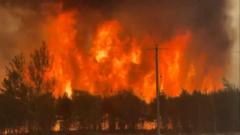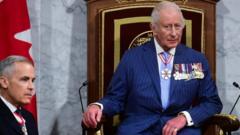As wildfires escalate across Canada, military aircraft and helicopters have been deployed to evacuate residents from the danger zone, especially in Manitoba, where conditions have worsened.
Military Aircraft Assists in Evacuating Residents Amid Wildfires in Manitoba

Military Aircraft Assists in Evacuating Residents Amid Wildfires in Manitoba
Evacuations are underway as military support reaches Canadian communities threatened by raging wildfires.
As the wildfires rapidly spread across the Canadian provinces, military aircraft and helicopters are being mobilized to evacuate residents, particularly in Manitoba. Thousands have fled western Canada, especially in the prairie regions of Saskatchewan and Manitoba, as wildfires rage amidst predictions of hot and dry weather over the coming days. Over 180 active fires have been reported, creating a haze of dense smoke that has drifted across much of Canada and impacted parts of the United States.
Both Saskatchewan and Manitoba have declared states of emergency for the month and are seeking international assistance in their firefighting efforts. Aerial visuals have showcased the extensive smoke plumes, marking the severity of the situation. The emergency has particularly affected the northern First Nations community of Pukatawagan, requiring urgent evacuation as more than 2,000 residents are still awaiting transport, as noted by a Manitoba official.
In the city of Flin Flon, with a population of 5,000, only emergency responders remain. Out of the 25 fires currently burning in Manitoba, 10 have been classified as "out of control." Neighbouring Saskatchewan is also struggling with 16 wildfires, with extreme conditions persisting as per the Canadian Interagency Forest Fire Centre (CIFFC). Meteorologists forecast grim weather ahead, with a cold front expected to bring strong winds, further complicating firefighting efforts.
Air quality concerns have been raised in the United States, as smoke from Canadian wildfires has put approximately 22 million Americans under air quality advisories. States such as Michigan and Wisconsin are particularly affected, with warnings indicating that smoke levels could be unhealthy for residents across northern Minnesota.
This year marks a historic wildfire season for Canada, with more than 42 million acres (17.3 million hectares) scorched. While wildfires are a natural occurrence in many regions, climate change is exacerbating the conditions that promote their spread. The UN's climate body stresses that increased heat leads to the depletion of moisture in both soil and vegetation, creating an environment prone to wildfires.





















